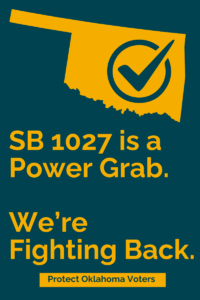FOR IMMEDIATE RELEASE
Contact: Amber England
Email: amber@strategy77.com
Phone: 405.334.7919
June 12, 2025
Broad Coalition of Voters File Lawsuit to Keep Power in the Hands of the Oklahoma People
Legal Challenge Clearly Outlines The Unconstitutional Restrictions in Senate Bill 1027 that will Practically Render the Citizen-Led Initiative Petition Process in Oklahoma Dead.
****NOTE TO EDITORS: A separate lawsuit addressing the retroactivity clause of Senate Bill 1027 was also filed today by proponents of State Question 836, an initiative petition making its way through the already lengthy initiative petition process. For press related to the lawsuit filed by proponents of 836 contact Alex Weinz by email at aweintz@amberintegrated.com or by phone: 914.282.3229
OKLAHOMA CITY, OK — A bipartisan group of Oklahoma voters filed a lawsuit today in the Oklahoma Supreme Court challenging the constitutionality of Senate Bill 1027, a recently passed law that imposes sweeping restrictions on the state’s century-old right to citizen-led ballot initiatives. Plaintiffs argue the law violates the Oklahoma Constitution, the U.S. Constitution, and the foundational right of citizens to propose and vote on laws when legislators fail to act.
The lawsuit, McVay et al. v. Cockroft and Drummond, names four plaintiffs from across the state: Kenneth Setter, Anthony Stobbe, Oklahoma voters and proponents of State Question 836; Steven Craig McVay, a rural Oklahoma voter; and Amy Cerato, president of Pike Off OTA.
“Senate Bill 1027 is an outright attack on the people’s right to govern themselves,” said Amy Cerato, a longtime grassroots advocate and president of Pike-Off OTA. “I’ve been organizing to hold the government accountable for years, and I’ve never seen such a blatant power grab to silence Oklahomans’ voices. This law is designed to make direct democracy in Oklahoma impossible.”
The plaintiffs argue that multiple provisions of SB 1027—individually and collectively—violate Article V of the Oklahoma Constitution, which guarantees the rights of initiative and referendum. The law imposes severe new barriers on signature gathering, including arbitrary caps on county-level signatures, new restrictions on petition circulators and funding, and unprecedented veto power for the Secretary of State over petition language.
“This law treats rural voters like me as second-class citizens,” said Craig McVay, a retired Oklahoma educator who lives in western Oklahoma. “It says my signature might not count—not because I’m not a voter, but because politicians have decided that too many people in my county signed already. That’s not democracy, that’s disenfranchisement.”
Key constitutional arguments in the lawsuit include:
- County-Based Signature Caps: Senate Bill 1027 limits how many signatures can be collected in each county, violating Article V, Section 2 of the Oklahoma Constitution and the Equal Protection by creating arbitrary distinctions among voters.
- Gist Language Approval: The law gives the Secretary of State, an unelected politically appointed position, unchecked authority to approve or reject petition summaries, violating the separation of powers and placing unconstitutional restraints on free speech.
- Circulation and Funding Restrictions: Senate Bill 1027 mandates circulation and funding restrictions that courts have repeatedly struck down as violations of the First Amendment.
- Special Laws and Unequal Treatment: The law singles out initiative and referendum proponents for restrictions not imposed on candidates, opponents, or other political campaigns.
“For a century, Oklahomans of all political stripes have used petitions to solve problems the Legislature either wouldn’t touch or couldn’t get across the finish line,” said Tony Stobbe, an Edmond resident, joining the lawsuit in his capacity as a proponent of State Question 836 that seeks to open Oklahoma’s primaries to all voters. “This is bigger than one law—it’s about defending our right to be heard when our government stops listening.”
The lawsuit asks the Oklahoma Supreme Court to declare SB 1027 unconstitutional, issue a writ of prohibition to prevent its enforcement, and provide interim relief to preserve petition rights while the case proceeds.
“This law doesn’t just bend the rules in favor of powerful politicians—it breaks them entirely for Oklahoma voters,” said Kenneth Setter, a plaintiff from Tulsa County, and proponent of State Question 836. “Oklahoma’s Constitution gives us the right to petition our government. Senate Bill 1027 strips that right away.”
To download the brief and supporting documents for the legal challenge to SB 1027 click here.
–End–


